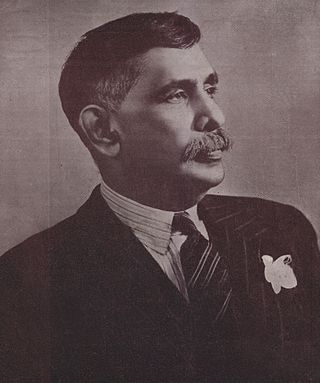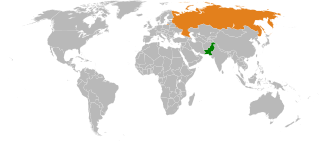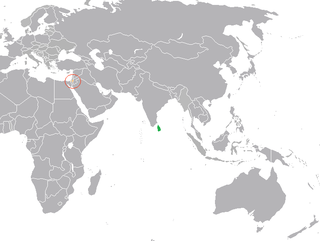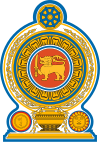
India has diplomatic relations with 201 states/dependencies around the globe, having 199 missions and posts operating globally while plans to open new missions in 2020–21 hosted by 11 UN Member States.

Chandrika Bandaranaike Kumaratunga is a Sri Lankan politician who served as the fifth President of Sri Lanka, from 12 November 1994 to 19 November 2005. The country's first and only female president to date and the country's second female prime minister. She is the daughter of two former prime ministers and was the leader of the Sri Lanka Freedom Party (SLFP) until the end of 2005.

Sirima Ratwatte Dias Bandaranaike, commonly known as Sirimavo Bandaranaike (මැතිනිය), was a Sri Lankan politician. She was the world's first female prime minister when she became Prime Minister of Sri Lanka in 1960. She chaired the Sri Lanka Freedom Party from 1960 to 1994 and served three terms as prime minister, two times as the chief executive, 1960 to 1965 and 1970 to 1977, and once again in a presidential system from 1994 to 2000, governing under the presidency of her daughter Chandrika Kumaratunga.

Don Stephen Senanayake was a Ceylonese statesman. He was the first Prime Minister of Ceylon having emerged as the leader of the Sri Lankan independence movement that led to the establishment of self-rule in Ceylon. He is considered as the "Father of the Nation".

Solomon West Ridgeway Dias Bandaranaike, often referred to by his initials as S. W. R. D. or S. W. R. D. Bandaranaike and known by the Sri Lankan people as "The Silver Bell of Asia", was the fourth Prime Minister of the Dominion of Ceylon, serving from 1956 until his assassination in 1959. The founder of the left-wing and Sinhalese nationalist Sri Lanka Freedom Party, his tenure saw the country's first left-wing reforms.

The Sri Lanka Freedom Party is one of the major and most well known political parties in Sri Lanka. It was founded by S.W.R.D Bandaranaike in 1951 and, since then, has been one of the two largest parties in the Sri Lankan political arena. It first came to power in 1956 and since then has been the predominant party in government on a number of occasions. The party is generally considered as having a democratic socialist or progressive economic agenda and is often associated with nationalist Sinhalese parties. The party follows a Non-Aligned foreign policy but always had close ties to socialist nations. The Sri Lanka Freedom Party is a Second Main constituent party in the Sri Lanka People's Freedom Alliance.

Between 1948 and 1972, Ceylon was an independent country in the Commonwealth of Nations, that shared a monarch with other dominions of the Commonwealth. In 1948, the British Colony of Ceylon was granted independence as Ceylon. In 1972, the country became a republic within the Commonwealth, and its name was changed to Sri Lanka.

The Soviet Union and Pakistan first established the diplomatic and bilateral relations on 1 May 1948.

The Republic of Vanuatu and the Union of Soviet Socialist Republics established official diplomatic relations on June 30, 1986 - three months to the day before Vanuatu established diplomatic relations with the United States. With the dissolution of the Soviet Union in 1991, the Russian Federation emerged as its successor state in 1991.

Russia–Zambia relations are the bilateral relations between Russia and Zambia.

Japan–Sri Lanka relations refers to the bilateral relations between the Sri Lanka and Japan.

Russia–Sri Lanka relations are the bilateral relations between Russia and Sri Lanka.

China–Sri Lanka relations are the bilateral relations between the People's Republic of China and Democratic Socialist Republic of Sri Lanka. There is a Chinese embassy located in Colombo and a Sri Lankan embassy situated in Beijing. Historical and cultural ties between the two countries extend back hundreds of years.

Relations between Palestine and Sri Lanka started in 1975 when the Palestine Liberation Organization (PLO) opened up an embassy in Colombo. After the Palestinian Declaration of Independence on 15 November 1988, the Republic of Sri Lanka and the Republic of Maldives were among few of the first countries in the world to recognize the State of Palestine. Left wing government led by Sirimavo Bandaranaike during the 1970s closed down the Israel embassy in support of the Palestinian cause. However, after the right wing government led by J.R. Jayewardene came to power Sri Lanka re-established ties with Israel. Diplomatic ties with Israel were suspended again under president Ranasinghe Premadasa in support of the Palestinian cause. In 2000 however ties with Israel were re-established. Sri Lanka currently supports the two state solution for the conflict. In 2014 Sri Lanka donated 130 million rupees to Palestine as humanitarian aid. During the UN speech of president Maithripala Sirisena he expressed support for the liberation struggle of the Palestinian people and urged the United Nations and all Member States to approach the Palestinian issue in a more humane manner taking the inhumane conditions they face into consideration. Sri Lanka voted in support of Palestine in almost every resolution brought to the UN.

S.W.R.D. Bandaranaike's foreign policy emphasized the idea of non-alignment however he had strong ties with socialist and communist nations as well as with Arab nations and India. He shifted the foreign policy of Sri Lanka from being pro-western under the previous right wing United National Party governments to non-alignment under his left wing Sri Lanka Freedom Party government. A remarkable accomplishment of his foreign policy was removing British naval and air bases from Sri Lanka.

Iraq–Sri Lanka relations describe diplomatic and other relations between the nations of Iraq and Sri Lanka. The countries were historically close under the Iraqi Ba'athist regime. Iraq was the largest buyer of Sri Lankan tea during the reign of Saddam Hussein. Ties between Sri Lanka and Iraq were disrupted during the Iraq War. However, in 2018 Iraq re-emerged as the largest buyer of Sri Lankan Tea. Sri Lanka has an embassy in Baghdad and Iraq has an embassy in Colombo.

Mexico–Sri Lanka relations are the diplomatic relations between Mexico and Sri Lanka. Both nations are members of the United Nations. Neither country has a resident ambassador.

The foreign policy of the Indira Gandhi government was the foreign policy of India between 1967 and 1977 during the Indira Gandhi premiership. It included a focus on security, by fighting militants abroad and strengthening border defenses. On 30 October 1981 at the meeting organised to mark silver jubilee celebration of the School of International Studies, Gandhi said, "A country’s policy is shaped by many forces- its position on the map, and the countries which are its neighbours, the policies they adopt, and the actions they take, as well as its historical experiences in the aggregate and in terms of its particular success or traumas."
Senake Dias Bandaranayake was a Sri Lankan archeologist, who served as emeritus professor and vice chancellor at University of Kelaniya. His research was focused on architecture, art history, and ancient paintings of South Asia, including Sri Lanka.

New Zealand–Ukraine relations are the foreign relations between New Zealand and Ukraine. Following the collapse of the Soviet Union, New Zealand formally established diplomatic relations with Ukraine in March 1992. The two countries subsequently expanded diplomatic contacts and economic relations over the next three decades. Following the 2022 Russian invasion of Ukraine, New Zealand supported Ukraine by condemning Russia's actions and providing diplomatic and military assistance.



















